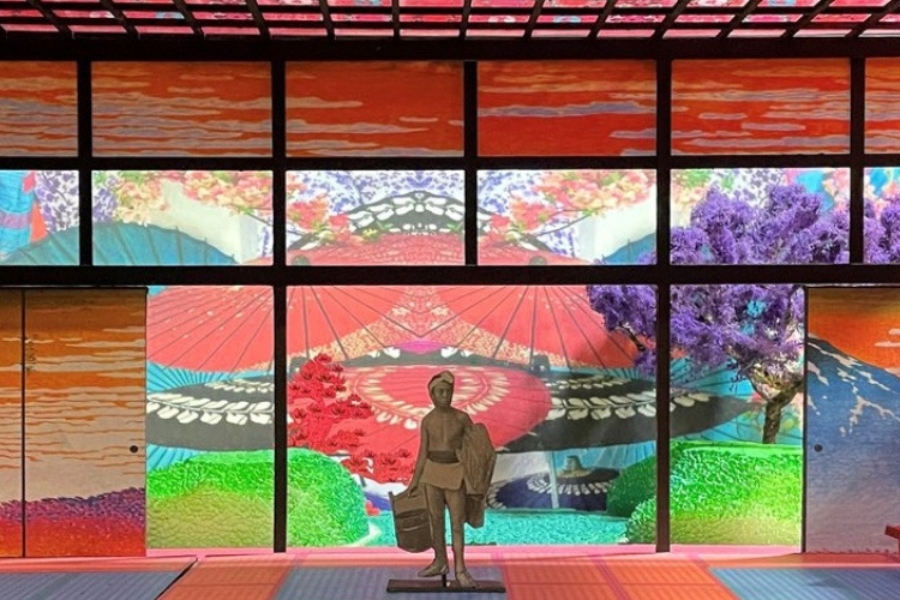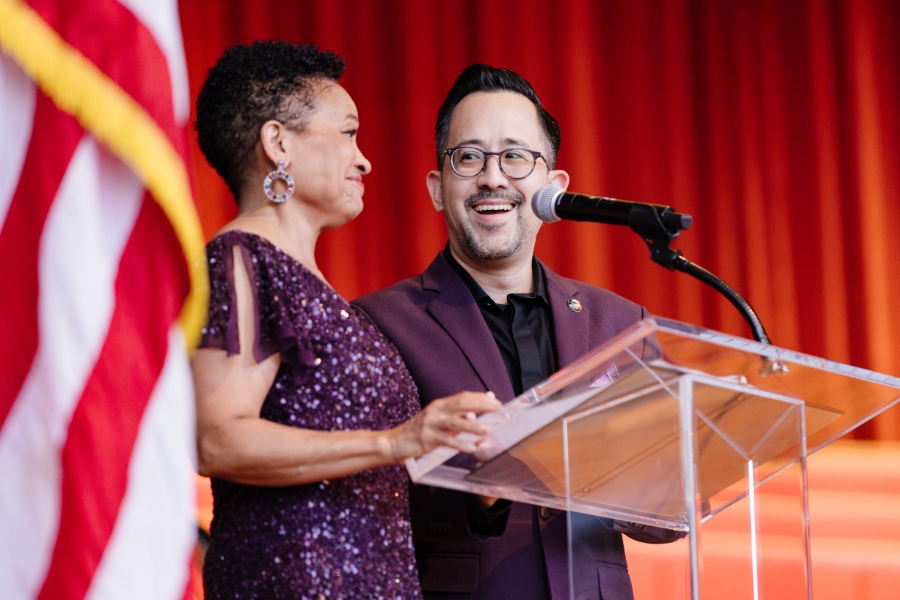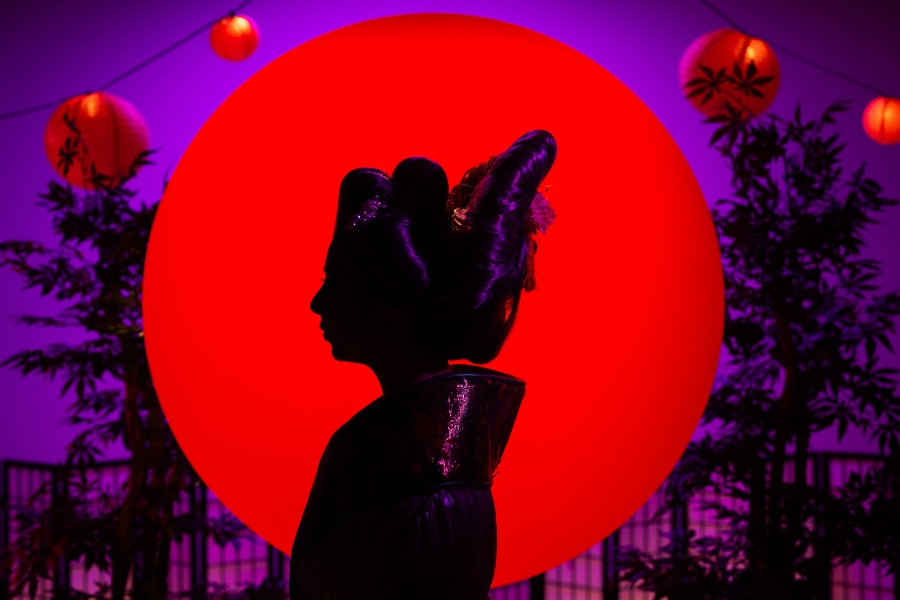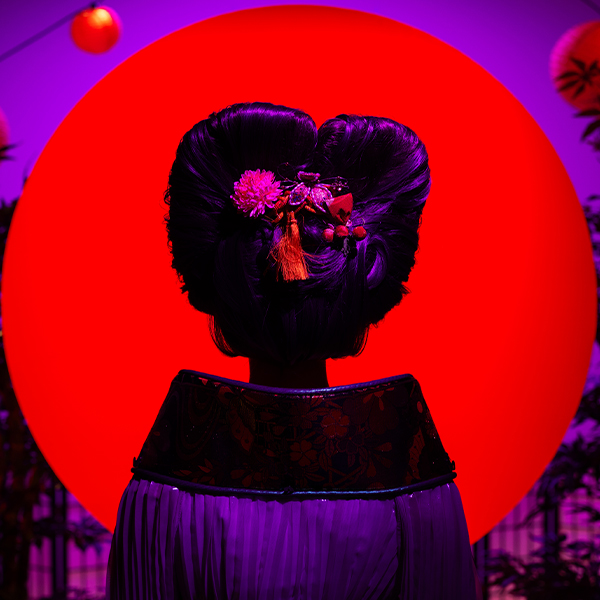August 04, 2025
"Madama Butterfly" takes flight, again
An inside look at Lyric’s bold 2025/26 production of the Puccini classic
Lyric Opera of Chicago’s upcoming production of Puccini’s Madama Butterfly confronts the challenge of reinterpreting one of opera’s most iconic and culturally complicated works. Directed by Lyric’s Chief Artistic Officer, Matthew Ozawa, the production doesn’t aim to preserve tradition for its own sake, but to reshape it with purpose. Ozawa invites audiences to experience the opera anew by honoring Puccini’s music while encouraging a deeper understanding of the story’s legacy and impact today.
A fourth-generation Japanese American, Ozawa has worked in opera for nearly two decades. “I’ve always felt like I belonged in opera,” he shared, “except in pieces set in Asia.” That disconnect became especially clear in his previous, more traditional productions of Madama Butterfly, a work long linked to exoticism, appropriation, and harmful stereotypes.

A rendering by set designer DOTS created ahead of the production's 2023 premiere at Cincinnati Opera.
Now, through a bold reimagining of his own creation, Ozawa returns to Puccini’s Madama Butterfly with a renewed vision. A co-production of Cincinnati Opera, Detroit Opera, Pittsburgh Opera, and Utah Opera, this Butterfly — coming to Lyric in March 2026 — began with Ozawa during the pandemic. He initially declined the opportunity. “I didn’t want to be pigeonholed into only directing Asian-set repertoire,” he said. He agreed only on the condition that the piece could be completely re-envisioned.
Through the forces and vision of an all-Japanese, all-female design team, Ozawa explored a wide range of potential settings — from postwar Nagasaki to a U.S. concentration camp, to a modern community center — but none felt aligned with Puccini’s libretto. “The women on my team told me they didn’t see themselves in Butterfly, especially not in the final scene,” he said. “It’s not a multidimensional vision of who we are.” His focus became clear: create a space where Asian audiences could see themselves reflected without changing the original text or score.
The breakthrough came with the decision to embrace the opera’s built-in false reality. “The opera itself is a fantasy, crafted by non-Japanese people,” Ozawa said. “So we leaned into that.”

Matthew Ozawa addresses the crowd at last summer's Sunday in the Park with Lyric concert alongside NBC 5's LeeAnn Trotter.
In this version, the story unfolds inside a stylized virtual reality video game. A modern-day man assumes the role of Pinkerton as a form of escape. Onstage, cherry blossoms bloom endlessly, nontraditional kimonos sweep across the stage, and Mt. Fuji looms in the distance, even though the libretto places the story in Nagasaki. Other aspects like Suzuki’s surreal entrance through a refrigerator in Pinkerton’s apartment further signal that this is not reality.
“The VR setting lets us be literal about the distorted, idealized view of Japan embedded in the opera,” Ozawa said. It also reframes Pinkerton as someone lost in fantasy and disconnected from real life.
The concept draws from Ozawa’s childhood love of video games. “I grew up obsessed with games like Donkey Kong, Super Mario Bros., and Oregon Trail,” he said. “Today, the minute you put on a VR headset, you’re immersed. That was the emotional entry point.”
Though the setting is contemporary, Ozawa made no changes to Puccini’s score or libretto. “Other productions have changed the text, but I wanted to preserve the music entirely,” he said. That decision reassured partner companies, even as the production challenged more traditional portrayals.
Instead of rewriting, Ozawa did reintroduce some rarely performed material from Puccini’s revised second version, a score first performed in Brescia, Italy, after the 1904 world premiere at La Scala was poorly received. This somewhat lesser-known revision by Puccini offers a more nuanced portrayal of the characters without altering the original score. “I didn’t want the audience to be lulled into singing along,” he said. “I wanted them to think about what they were seeing.”
Bringing this vision to the stage involved taking significant risks. Ozawa recalled his anxiety before the production’s premiere. “Because we’re Asian Americans reimagining a beloved opera, I was nervous people would wonder, ‘What have we done?’” But the reaction was immediate. “In the final 30 seconds, the room was electric.”

Puccini's Madama Butterfly is onstage at Lyric March 14-April 12, 2026.
That moment affirmed his approach to the work’s purpose and impact. “People love the tradition of Butterfly,” Ozawa said. “It was important to create a production of the title where those who love the tradition and those who never felt it was their story could both find a way in.”
He also emphasized the responsibility that comes with presenting traditional works. “Producing the opera exactly as it’s always been done can do more harm than good,” he said. “We have to make room for both upholding legacy while allowing for evolution.”
Looking ahead, Ozawa remains committed to his role in helping to support Lyric’s artistic future by balancing tradition with new ideas.
“My goal is to have productions that look traditional and feel traditional, but have a breath of contemporary fresh air that uplifts the beauty of human voice and the power of storytelling.”
Puccini’s Madama Butterfly runs March 14 to April 12, 2026, at Lyric Opera of Chicago. Learn more and purchase tickets at lyricopera.org/butterfly.

